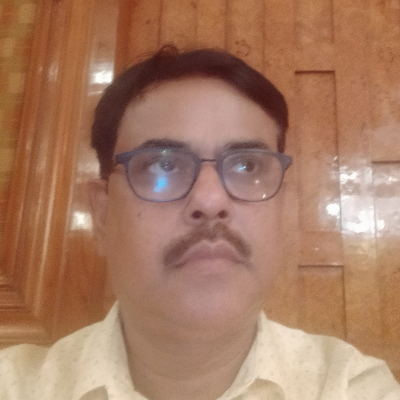At this crucial juncture, as DHSK College, now autonomous, is transitioning from affiliation to self governance, the fraternity is poised on the threshold of great possibilities and greater challenges. While the potential for excellence of our institution is undeniable, the path is problem-ridden and strewn with hurdles. The foremost objective now is to lead the institution from strength to excellence—in academics, research, sports, culture—in every aspect, both curricular and extra- curricular. Assuming a leadership role at such a period of transition and change is both daunting yet stimulating. As an alumnus of this institution and a serving Faculty of Economics since 1992, I have witnessed the highs and lows of my alma mater and have been a part of its evolution. It is time to take the next steps to consolidate the milestones hitherto created and to forge ahead towards new prospects and goals.
The primary focus of an educational institution is the fostering of an academic environment that encourages it’s students to think critically and innovatively as well as acquire knowledge and skills in tandem with their aptitudes and interest. The adaptation and implementation of the National Education Policy 2020 in the undergraduate and postgraduate curricula along with newly emerging administrative and academic technologies have revolutionized the theories and operative dynamics of Higher Education. Further, the revival of the Indian Knowledge Systems has opened up a vista of new possibilities in terms of multi and interdisciplinary subject engagements and novel avenues of research and career options.
This is the moment to seize, to make the most of! We must believe that the present is the best, most opportune, the most creative, the shaping force of the future. I consider myself fortunate to have been given the privilege and opportunity to be at the helm of affairs at such a moment of change and growth of my alma mater, to be a part of its historic journey in the march forward to achieve the status of DHSK University. My solemn and heartfelt endeavours shall be directed in the interest of the college and it’s fraternity, especially the students—the future architects of our nation.
Dr. Partha Ganguli
Department of Economics
DHSK College ( Autonomous)

ISCD & ICSSR Short time fellow.
A sports enthusiastic and Sports organiser.
Served as Secretary SPICMACAY and organised over 100 programmes of National and International Artistics in the region.
Former State Panel cricket Umpire.
Worked in a project Brahmatwinn with Indian Partner IIT Rorkee.
From 2005 onwards voluntarily sérved many state and national level NGOs.
Worked in a project Right to Information; NCPRI, New Delhi
Worked in a project Mother and Child Health; CRY in association with BAL Sakha Assam.
Worked in a project People’s Mid-Term Appraisal of 11th FYP; Wada Na Todo Abhiyan
Attended Training Course on Computer Applications in Social Science Data analyses, ICSSR, New Delhi ; Organised by Institute for Social Change and Development: GUWAHATI
Attended Faculty development Programme in ENTREPRENEURSHIP; Indian Institute of Entrepreneurship, Guwahati,2004
Attended Research Training Programme in Economics: UNCTAD-DFID-GOI
Water Conflicts in North east India; Authors Workshop; 10-11 Dec.2010; Don Bosco Institute,Kharguli; Policy Dialogue on Water conflicts (Pune) and Aaranyak (Guwahati)
Attended Workshop on Environmental Flows;Aaranyak & River Research Centre, Kerela
Served as Convenor Information and Career Guidance Cell; D.H.S.K.College
Convenor " CCEE (Coaching Centre for Entrace Exams)"; D.H.S.K.College
Coordinator IQAC; ; D.H.S.K.College
Former Executive Member and Member SEWA (NGO)
Former President BAL SAKHA ASSAM and presently associated with the NGO in their various National and International projects and rendering voluntary services.
1. Partha Ganguli: “The Growth of Small Tea Growers in Assam: Its impact on the Environment,” UGC sponsored State Level Seminar on Impact of Human Activities on Environment; Jagi Road College, Jagiroad, Assam, 5th October 2002, pp 40-47.
2. Partha Ganguli “Changing Needs: Necessity of Creation of Entrepreneurs in the context of the North-East Indian”; National Seminar on Need for Entrepreneurship Education in the Changing Scenario, Indian Institute of Entrepreneurship, Guwahati; 2nd &3rd March 2005. Pp 28-32.
3. Partha Ganguli “ Entrepreneurship Education as Institutionalized Best Practice”; Best Practices in Higher Education with Special Reference to the Colleges of North East India, National Seminar, J.B.College, Jorhat, Assam; 4th&5th November; 2006.pp 92-94.
4. Partha Ganguli, S.Boruah, P.K.Dutta, A.Sharma and S.P.Biswas: “Prospects of Ecotourism in Temple Tanks and Floodplain Lakes of Upper Assam”;Proceedings of TAAL 2007;12th world Lake Conference, Edited by Sengupta M., and Dalwani, R. 2008, Jaipur,28th-2nd November, 2007; pp 1329-1332.
5.S.Boruah, Partha Ganguli. S.P.Biswas and A.Sharma “Land Use and Land Cover Changes: Its Impact on the Wetland Ecosystem of Maguri Beel, Assam”; Conservation and Restoration of Lakes; editors V.K.Choubey, R.D.Singh, Omkar Singh, and M.K.Singh, National Institute of Hydrology, Roorkey, October 2008. Pp. 605-615.
6.S.Boruah, Partha Ganguli, J.N.Das, R.Bania, A.Sontosh Kumar, A.Sharma, M.Choudhury Changdar and S.P.Biswas: Proceeding, National Seminar, Ecological and Socio-Economic Consequences of Large Dams, Ecology and Socio-Economics of Maguri Beel of Assam: Anthropogenic Impact with Special Reference to Proposed Dams. Lakhimpur Girls’ College, Lakhimpur, Assam, 10th & 11th February 2011. Pp 70-84.
7 . Partha Ganguli;Problems of Small Tea Growers in Assam; Mahaveer Publication House; Dibrugarh, Assam, 2013, ISBN 978-81-925276-8-0
8. S.Boruah, Partha Ganguli : “Seismic Survey for OIL in the Brahmaputra River Basin: Scientific Understanding and People’s Perceptions”,Water Conflicts in Northeast India: A compendium of Case Studies; Edited by Partha J.Das, Chandan Mahanta, K.J.Joy, Suhas Paranjape, Shruti Vispute; Water Conflicts in India, Forum for Policy Dialogue on water Conflicts in India, March 2013.pp 1-9.
9. Partha Ganguli; Small Tea Growers of Assam: Theories, Practices and Challenges of an Indigenous Entrepreneurship; ijifr, volume 2-issue 1, september 2014, ISSN(online) 2347-1697; Impact factor=3.059